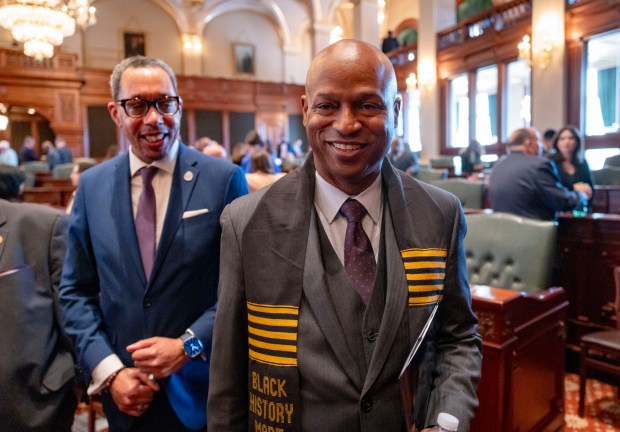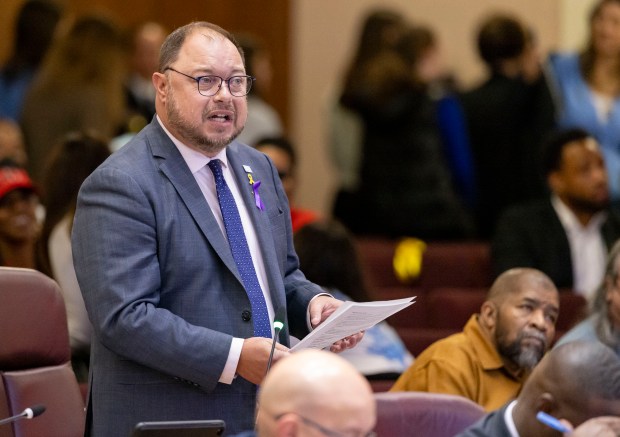SPRINGFIELD — With less than three weeks until the Illinois legislature’s scheduled adjournment, lobbyists, nonprofits, activists and others are ramping up efforts to get a piece of the state’s multibillion-dollar budget for everything from after-school funding to housing for people leaving prison.
But Gov. JB Pritzker’s February spending plan leaves little wiggle room for lawmakers. In addition to a projected budget shortfall estimated at close to $1 billion, legislators have to come to terms with President Donald Trump’s tariffs that have rattled the economy, while his newly formed Department of Government Efficiency has vowed to slash significant federal funding across the board. Pritzker’s adversarial relationship with the Republican president could make Illinois a target for any of those federal cutbacks.
At a luncheon event last week, House Speaker Emanuel “Chris” Welch discussed how the uncertainty could force lawmakers back to Springfield this summer to make adjustments to the budget that goes into effect July 1.
“We’re going to pass the budget here in the next couple of weeks with the information we know. There’s a lot of things we don’t know,” the Hillside Democrat said. “The only thing we can do is be committed to a process that’s going to have everyone at the table and continue to say we’re not going to spend more than we’re bringing in.”
The state’s fiscal picture brightened somewhat with an April report from the legislature’s Commission on Government Forecasting and Accountability that projected state revenue growth would be $266 million higher than the March estimate. The commission’s figure, however, still falls $471 million short of the $55 billion in state revenues Pritzker used in his February budget proposal.
Last year, legislators had to pass a $750 million tax hike package to cover a deficit pegged at about $900 million. It took the House three tries and a series of procedural maneuvers to get the package through and balance a $53.1 billion spending plan.
Pritzker in February proposed no new taxes. But his proposal includes increased tax rates on table games at casinos outside Chicago, putting blackjack and roulette on the higher rate used for slot machines. The proposal also calls for a pause in the final shift of state sales taxes on motor fuel purchases to the state’s road construction fund, as well as an amnesty program for delinquent taxpayers. Together, those changes would generate an estimated $469 million, according to the governor’s office.
“I would say it’s hard to make a credible argument that those things are tax increases on working families, which is what the governor’s budget avoids,” Andy Manar, the deputy governor on budget issues, said last week.
GOP state Rep. C.D. Davidsmeyer of Jacksonville, who co-chairs COGFA, and other Republicans in the legislative superminority have repeatedly pointed out that state budgets under Democratic leadership have grown in the last decade from under $40 billion to this year’s proposal of $55.2 billion, a rise the GOP attributes to bloated spending.
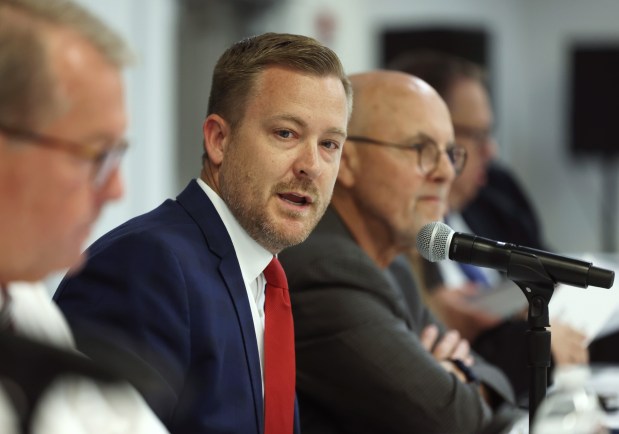
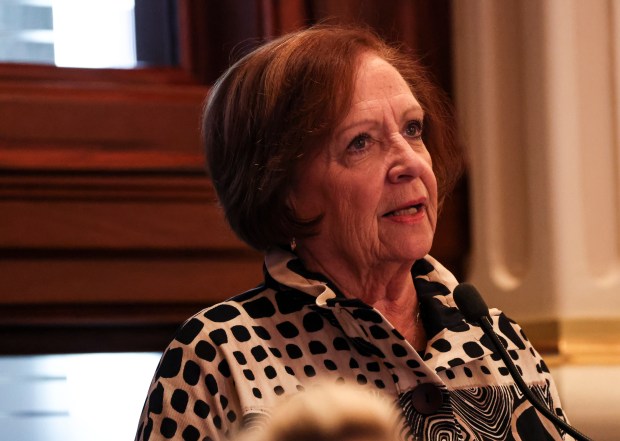
Republicans have spoken less about the uncertainty of future federal funding for Illinois and more about the need for a budget without increased taxes.
State Rep. Norine Hammond of Macomb, lead budget negotiator for the House GOP, said she and other Republicans have had only cursory discussions with House Democrats about the budget.
“They will continue to increase wasteful spending and absolutely continue to raise taxes on hardworking Illinois families and businesses,” Hammond said. “State government desperately needs structural reforms and to learn to live within its means.”
State Rep. Amy Elik, a Republican from Godfrey who sits on the House General Services Appropriations Committee, pointed to a letter the Pritzker administration sent to state agencies last year calling on them to identify possible cuts. But Elik said she has since not heard anything about “sufficient cuts.”
Pritzker told lawmakers in February to be prepared for additional cuts to counter any budget requests they would make. But he said last month that “people aren’t showing up at my door with proposed cuts,” adding that “any increases that they’re going to propose, whatever it is that I’m signing, we’re going to have to make this budget balanced.”
Pritzker’s proposal included eliminating a health care program for noncitizen immigrants under 65, which drew criticism from some fellow Democrats in Springfield. The move would save an estimated $330 million in state funding, the governor’s office said.
Manar last week said Pritzker remained firm on cutting the Healthcare Benefits for Immigrant Adults program.

“If you look through his proposal, if you look through the details, you’ll see any number of programs that had to be reduced to bring the budget into balance,” Manar said. “This is a challenging year without question. These are tough decisions.”
State Sen. Graciela Guzmán, a Chicago Democrat, said lawmakers are still negotiating ways to keep funding the program.
“We’ve heard from our community … that this will have disastrous effects (for) individual people, like, neighbors that I have in my district that depend on HBIA for their cancer treatment for surgical care that they have lined up,” Guzmán said. “I know of cases where people are on the transplant list and medical systems are telling them that they might have to be removed from the list if they lose coverage. This will cause individual instability for a lot of people.”
As he has in past years, Pritzker proposed the minimum mandatory annual increase of $350 million for funding K-12 public schools through the state’s “evidence-based funding” formula, which is designed to deliver equitable funding for school districts in low-income communities. State Rep. Will Davis, a Democrat from Homewood who chairs the House Appropriations Elementary & Secondary Education Committee, is again fighting for more, saying the increase needs to be at least $550 million.
“New money is certainly important and if the new money is represented by $350 million, of course we’re not going to say ‘no,’ but the idea is to try to get to where we’re going a little bit quicker,” he said.
Last week, lawmakers outlined some of their budget requests before various appropriations committees. State Sen. Mike Simmons, a Chicago Democrat, pitched a request for $25 million to provide grants for schools that want to purchase electric buses.
“We know that these will easily meet the needs of students and staff while improving public health,” he said. “Electric buses use zero emission, eliminating any risk of children or staff being exposed to toxic fumes generated by traditional school buses.”
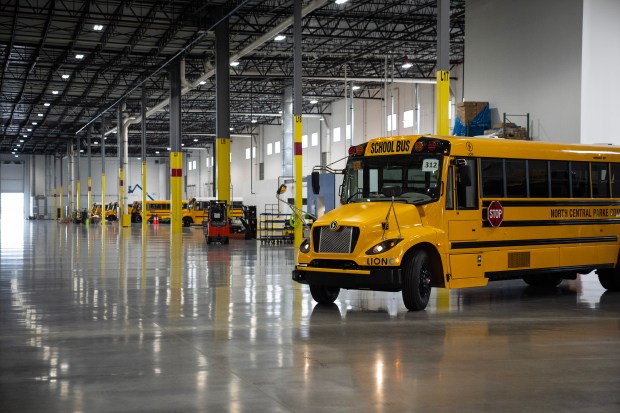
The hearing came a day after electric bus company Lion Electric learned from a court-appointed monitor that the company would likely be liquidated. Lion Electric had to close its Joliet plant recently after being touted as a leading light of Illinois’ growing electric vehicle industry by Pritzker.
Bruce Mainzer, who leads the electric vehicle task force for the Chicago Metro Chapter of the Climate Reality Project, testified that Lion’s Joliet plant closed in part because of delays and uncertainty over the grant funding process for electric school buses.
“Decarbonizing our transportation system must be a statewide effort regardless of ZIP code,” he said. “Electric buses significantly reduce exposure to harmful pollutants such as particulate matter, nitrogen oxides, carbon monoxide and, of course, carbon dioxide, the primary driver of climate change.”
Mainzer said the $25 million appropriation would fund around 200 school buses. He said an electric Class C school bus costs about $375,000, three times the cost of a comparable diesel bus, which averages $125,000. The electric buses “offer significant long-term savings, conservatively estimated at $10,000 or more annually in fuel and maintenance,” he said while acknowledging that it’s difficult for school districts to leverage those savings to offset the higher upfront cost.
During the same hearing, Sen. Guzmán made a push for $50 million in after-school programming, and said tens of thousands of students statewide lost after-school services in the last two years. She said she’s received feedback from students at a charter school that has suffered from cuts to their programming.
“They shared what having that kind of uncertainty in their after-school programming has meant, that staff that has been able to provide emotional social support for them is no longer consistently available,” Guzmán said. “This appropriation seems more essential than ever.”
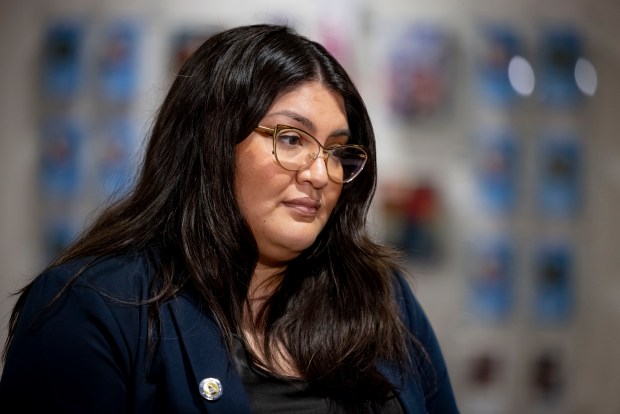
Susan Stanton, executive director for ACT Now Illinois, which advocates for access to after-schools programs, said studies show that students who participate in after-school programming overall have better school attendance, grades, standardized test scores and exhibit better behavior.
“In these programs, students find mentors that often stay with them for the rest of their lives,” Stanton said. “So this is not like an added benefit to the school day. It’s a critical, essential component.”
At another hearing last week on health and human services, state Rep. Maurice West of Rockford talked about appropriations for housing programs and other services for formerly incarcerated people, saying he looks at these programs as an investment to reduce recidivism in communities.
According to information provided by the Illinois Justice Project, a criminal justice reform advocacy organization, the Home for Good initiative wants to allocate $103 million for the Illinois Housing Development Authority and the Illinois Criminal Justice Information Authority to help community groups carry out this effort.
Ahmadou Dramé, the justice project’s director, testified that this program would fill “a massive hole” in the state’s human services system.
“There are over 3 million adults in Illinois who have arrest or conviction records, and each year nearly 200,000 people in Illinois leave prisons and jails. The reentry process can be confusing and challenging, with what seems sometimes like purposeful barriers at every turn,” he said.
“Finding affordable housing is one of the most significant barriers that people face,” Dramé said. “Illinois has only 34 affordable and available housing units for every 100 extremely low-income renters. This makes housing challenging for all people with low-incomes in Illinois, but especially so for people with records and those at the highest risk of gun violence.”
Welch, meanwhile, at the hotel event noted every budget “is its own preacher” and lawmakers “in many ways play the hand we’re dealt.”
“We’re going to pass balanced budgets,” he said. “And listen, when you’re in charge of a large group of tax-and-spend Democrats, that ain’t always easy.”


